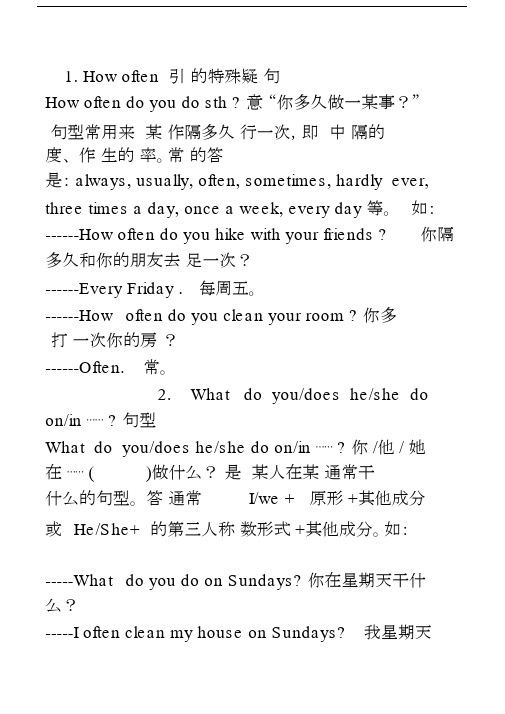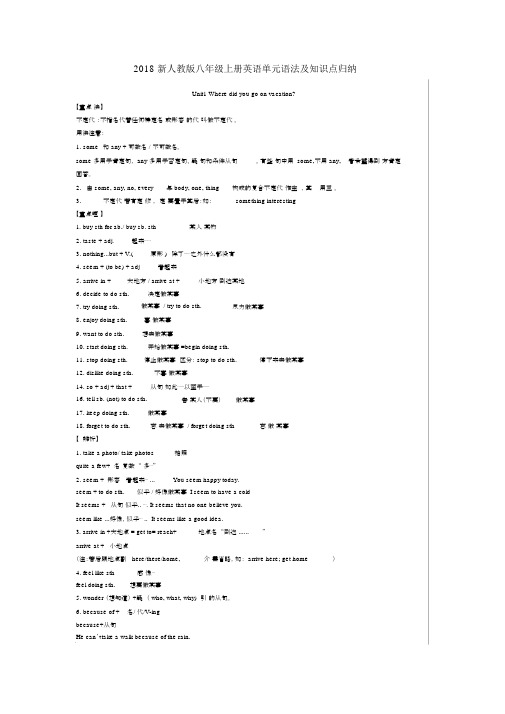2018新人教版八年级上册英语单元语法及知识点归纳.docx
新人教版英语八年级上各单元知识点大归纳(K12教育文档)

(完整word版)新人教版英语八年级上各单元知识点大归纳(word版可编辑修改)编辑整理:尊敬的读者朋友们:这里是精品文档编辑中心,本文档内容是由我和我的同事精心编辑整理后发布的,发布之前我们对文中内容进行仔细校对,但是难免会有疏漏的地方,但是任然希望((完整word版)新人教版英语八年级上各单元知识点大归纳(word版可编辑修改))的内容能够给您的工作和学习带来便利。
同时也真诚的希望收到您的建议和反馈,这将是我们进步的源泉,前进的动力。
本文可编辑可修改,如果觉得对您有帮助请收藏以便随时查阅,最后祝您生活愉快业绩进步,以下为(完整word版)新人教版英语八年级上各单元知识点大归纳(word版可编辑修改)的全部内容。
八年级上册英语各单元知识点大归纳Unit 1 Where did you go on vacation?【语法解析】不定代词:不指名代替任何特定名词或形容词的代词叫做不定代词。
用法注意:1. some 和any +可数名/不可数名.some 多用于肯定句,any多用于否定句、疑问句和条件从句。
有些问句中用some,不用any,问话者希望得到对方肯定回答. 2。
由some, any, no, every 构成的复合不定代词作主语时,其谓语动词用第三单3. 不定代词若有定语修饰,该定语要置于其后:如:something interesting二、知识点:1. buy sth for ab./ buy sb. sth 为某人买某物2. taste + adj. 尝起来……3。
nothing ….but + V.(原形)除了……之外什么都没有4. seem + (to be) + adj 看起来5。
arrive in + 大地方 / arrive at + 小地方到达某地6. decide to do sth. 决定做某事7。
try doing sth. 尝试做某事 / try to do sth。
人教版八年级上册英语语法、短语和知识点总结.docx

八年级上册英语语法.短语和知识点总结Unit 1 Where did you go on vacation?本单元的话题:谈论假期活动内容,复习一般过去时。
本单元的语法:1 •复习一般过去时;2•学习不定代词和不定副词的用法。
1.本单元出现的动词不规则过去式有:i s\am--was 是are -- were 是go--went 去buy一bought 买take --took 拿走do\does一did feed一fed 喂see一saw 看见eat一ate 吃have\has一had 有,吃feel—felt 感觉ride—rode 骑get—got 到达,得到can—could 能,会forget一forgot 忘记drink一drank 喝find一found 找到2.不定代词和不定副词的用法:some bodyany oneevery thingno where (疑问畐廿词)不定代词和不定副词(1)左边的some、any> every> no 与右边的body> one> thing 构成不定代词,some> any> every> no与右边的疑问副词where构成不定副词;(2)一般情况下以some开头的不定代词和不定副词用于肯定句,以any开头的不定代词和不定副词用于否定句、疑问句;以no开头的不定代词和不定副词表示否定含义(no one为两个单词);(3)不定代词或不定副词和形容词连用吋,形容词放在后面。
He has something important to do•他有重要的事情要做。
(肯定句用something,形容词important放后)Did you buy anything special?(一般疑问句用anything,形容词special 放后)Did you go anywhere interesting last month?上个月你去令人感兴趣的地方了吗?(一般疑问句用不定副词anywhere,形容词interesting放后)(4)不定代词和不定副词做主语时,后面的动词用单数形式。
2018-2019学年人教版八年级英语上册全册知识点总结

2018-2019学年人教版八年级英语上册全册知识点总结Unit 1 Where did you go on n?本单元的话题是谈论假期活动内容,同时复一般过去时。
本单元的语法包括复一般过去时和研究不定代词和不定副词的用法。
不定代词和不定副词的用法包括以下几点:左边的some、any、every、no与右边的body、one、thing构成不定代词,而some、any、every、no与右边的疑问副词where构成不定副词。
一般情况下以some开头的不定代词和不定副词用于肯定句,以any开头的不定代词和不定副词用于否定句或疑问句。
以no开头的不定代词和不定副词则表示否定含义(no one为两个单词)。
当不定代词或不定副词和形容词连用时,形容词放在后面。
例如:He has XXX do.(他有重要的事情要做,肯定句用something,形容词important放后)Did you buy anything special?(你买了什么特别的东西吗?一般疑问句用anything,形容词special放后)Did you go anywhere interesting last month?(上个月你去了什么有趣的地方吗?一般疑问句用不定副词anywhere,形容词interesting放后)不定代词和不定副词做主语时,后面的动词用单数形式。
例如:Everyone is here today.(今天每个人都在这里)本单元的短语和知识点包括:go on n(去度假)、go to the mountains(上山/进山)、stay at home(呆在家)、go to the beach(去海滩)、visit museums(参观博物馆)、go to summer camp(去参观夏令营)、study for tests(为考试而研究/备考)、go out(出去)、quite a few(相当多/不少,后跟可数名词复数)、take photos(照相)、most of the time(大部分时间)、buy sth for sb = buy sb sth(为某人买某物)、taste good(尝起来很好)。
新人教版八年级上册英语单元语法及知识点整理

新人教版八年级上册英语单元语法及知识点整理Unit 1 - How do you study for a test?Grammar- Present Simple Tense Present Simple Tense- Used to express habits or routines- Example: I usually study for tests by making flashcards.- Present Continuous Tense Present Continuous Tense- Used to express actions happening at the moment of speaking- Example: I am studying for my English test right now. Knowledge Points- Adverbs of Frequency Adverbs of Frequency- Used to talk about how often something happens- Example: I always review my notes before a test.Unit 2 - What's the matter?Grammar- Subject-Verb Agreement Subject-Verb Agreement- Singular subjects require singular verbs and plural subjects require plural verbs- Example: He has a headache. They have headaches.Knowledge Points- Health Problems and Symptoms Vocabulary Health Problems and Symptoms Vocabulary- Example: headache, fever, sore throat, etc.Unit 3 - Where did you go?Grammar- Past Simple Tense Past Simple Tense- Example: I visited my grandparents last weekend.Knowledge Points- Vocabulary for Places Vocabulary for Places- Words and phrases related to different locations- Example: museum, park, restaurant, etc.Unit 4 - Don't eat in class.Grammar- Imperative Sentences Imperative Sentences- Example: Don't talk during the exam.Knowledge Points- Classroom Rules and Guidelines Classroom Rules and Guidelines- Vocabulary and phrases related to behavior in the classroom - Example: raise your hand, be quiet, pay attention, etc.Unit 5 - Why do you like pandas?Grammar- Questions with "Why"Questions with "Why"- Used to ask for reasons or explanations- Example: Why do you like playing basketball? Knowledge Points- Animal Vocabulary Animal Vocabulary- Words and phrases related to different types of animals- Example: lion, tiger, panda, etc.。
(完整word版)人教版八年级上册英语各单元语法.doc

1. How often 引的特殊疑句How often do you do sth ? 意“你多久做一某事?”句型常用来某作隔多久行一次,即中隔的度、作生的率。
常的答是: always, usually, often, sometimes, hardly ever, three times a day, once a week, every day 等。
如:------How often do you hike with your friends ?你隔多久和你的朋友去足一次?------Every Friday .每周五。
------How often do you clean your room ? 你多打一次你的房?------Often.常。
2.What do you/does he/she do on/in ⋯⋯ ? 句型What do you/does he/she do on/in ⋯⋯ ? 你 /他 / 她在⋯⋯ ()做什么?是某人在某通常干什么的句型。
答通常I/we + 原形 +其他成分或He/She+的第三人称数形式 +其他成分。
如:-----What do you do on Sundays? 你在星期天干什么?-----I often clean my house on Sundays?我星期天常打扫我的房子。
-----What does your father do after supper?你爸爸晚饭后干什么?-----He usually goes for a walk.他通常取散步。
对划线部分提问1. The teacher hardly gives us a test._____ _____ ______ the teacher give you a test?2. I never get up before five o’clock?_____ _____ do you get up before five o’clock?3. Li Tao often has rice for lunch._____ _____ Li Tao often _____ for lunch?4. I usually read English in the morning._____ _____ you usually ______ in the morning?5.My mother goes to see my grandparents twice a month._____ _____ _____ your mother _____ to see your grandparents?答案:1. How often does 2. How often 3. What does have 4. What do do5. How often does go情态动词 should 的用法情态动词 should 和 can ,may ,must 一样,没有人称和数的变化,有词意,但都不能单独作谓语,必须和后面的动词原形一起构成谓语。
(word完整版)人教版初二上册英语知识点总结归纳,推荐文档

人教版初二上册英语知识点总结归纳导读:本文人教版初二上册英语知识点总结归纳,仅供参考,如果能帮助到您,欢迎点评和分享。
想学好英语上课要多做笔记,认真听,跟上老师的节奏,把该背的单词背熟,语法记牢。
为大家归纳整理了人教版初二上册英语语法、短语和知识点,希望对你的复习有帮助。
八年级(初二)上册英语语法、短语和知识点总结归纳Unit 1 Where did you go on vacation? 本单元的话题:谈论假期活动内容,复习一般过去时。
本单元的语法:1.复习一般过去时;2.学习不定代词和不定副词的用法。
2.不定代词和不定副词的用法:(1) 左边的some 、any 、every 、no 与右边的body 、one 、thing 构成不定代词,some 、any 、every 、no 与右边的疑问副词where 构成不定副词;(2) 一般情况下以some 开头的不定代词和不定副词用于肯定句,以any 开头的不定代词和不定副词用于否定句、疑问句;以no 开头的不定代词和不定副词表示否定含义(no one 为两个单词);(3) 不定代词或不定副词和形容词连用时,形容词放在后面。
He has something important to do. 他有重要的事情要做。
(肯定句用something ,形容词important 放后)Did you buy anything special? ( 般疑问句用anything ,形容词special 放后)Did you go anywhere interesting last month? 上个月你去令人感兴趣的地方了吗?(一般疑问句用不定副词anywhere ,形容词interesting 放后)(4)不定代词和不定副词做主语时,后面的动词用单数形式。
Everone is here today. 今天每个人都在这里。
本单元的短语和知识点:1. go on vacation 去度假go to the mountains 上山/进山2.stay at home 呆在家go to the beach 去海滩visit museums 参观博物馆go to summer camp 去参观夏令营3. study for tests 为考试而学习备考go out 出去4. quite a few 相当多,不少(后跟可数名词复数)take photos 照相most of the time 大部分时间5.buy sth for sb = buy sb sth 为某人买某物6. taste good. 尝起来很好taste(尝起来)、look(看起来)、sound(听起来)为感官动词,后跟形容词7. have a good\great\fun time 过得高兴,玩得愉快(=enjoyon eself) 8. go shopp ing 去购物9. nothi ng …but+ 动词原形:除了……之外什么都没有He had nothing to do at home but read yesterday. 昨天他在家除了读书无事可做。
新人教版八年级上册英语单元语法及知识点归纳.docx

2018 新人教版八年级上册英语单元语法及知识点归纳Unit1 Where did you go on vacation?【重点法】不定代:不指名代替任何特定名或形容的代叫做不定代。
用法注意:1. some和any +可数名/不可数名。
some 多用于肯定句, any 多用于否定句、疑句和条件从句。
有些句中用 some,不用 any, 者希望得到方肯定回答。
2.由 some, any, no, every与 body, one, thing构成的复合不定代作主,其用三。
3.不定代若有定修,定要置于其后:如:something interesting【重点短】1. buy sth for ab./ buy sb. sth某人某物2. taste + adj.起来⋯⋯3. nothing...but + V.(原形 )除了⋯⋯之外什么都没有4. seem + (to be) + adj看起来5. arrive in +大地方 / arrive at +小地方到达某地6. decide to do sth.决定做某事7. try doing sth.做某事 / try to do sth.尽力做某事8. enjoy doing sth.喜做某事9. want to do sth.想去做某事10. start doing sth.开始做某事 =begin doing sth.11. stop doing sth.停止做某事区分: stop to do sth.停下来去做某事12. dislike doing sth.不喜做某事14. so + adj + that +从句如此⋯⋯以至于⋯⋯16. tell sb. (not) to do sth.告某人(不要)做某事17. keep doing sth.做某事18. forget to do sth.忘去做某事 / forget doing sth忘做某事【辨析】1. take a photo/ take photos拍照quite a few+ 名复数“ 多⋯”2. seem + 形容看起来⋯ ...You seem happy today.seem + to do sth.似乎 / 好像做某事 I seem to have a coldIt seems + 从句似乎.. ⋯. It seems that no one believe you.seem like ...好像,似乎⋯.. It seems like a good idea.3. arrive in +大地点= get to= reach+地点名“到达 ......”arrive at + 小地点(注:若后跟地点副 here/there/home,介需省略,如: arrive here; get home)4. feel like sth感像⋯feel doing sth.想要做某事5. wonder (想知道) +疑( who, what, why) 引的从句。
2018年最新修订版人教版英语八年级上册知识点归纳.doc人教版八年级上册知识点归纳

2018年修订版八年级上册英语单元知识点归纳Unit1 Where did you go on vacation?短语归纳1.go on vacation去度假2.stay at home待在家里3.go to the mountains去爬山4.go to the beach去海滩5.visit museums 参观博物馆6.go to summer camp去参加夏令营7.quite a few相当多8.study for tests为测验而学习9.go out出去10.most of the time大部分时间11.have a good time doing=have fun doing =enjoy oneself玩得高兴12.of course=sure =certainly当然13.feel like给……的感觉;感受到14.go shopping去购物15.in the past在过去16.walk around四处走走17.because of+名词短语:因为because+句子18. a/one bowl of…一碗……19. the next day第二天20.drink tea喝茶21.find out找出;查明22.go on继续23.take photos照相24.something important重要的事25.up and down上上下下e up出来come out 出版发行27.go out with anyone 跟别人出去28.say about 发表对…看法29.rain hard 雨下得大30.too much+不可数名词太多too many+可数名词复数太多much too+形容词太用法:1.buy sth. for sb. / buy sb. sth.为某人买某物2.taste / look/sound/smell good. 尝起来/看起来/听起来/闻起来不错3.nothing…but+动词原形除了……之外什么都没有4.seem+(to be)+ adj. 看起来……5.arrive in+大地点/ arrive at+小地点/get to +地点/reach +地点到达某地6.decide to do sth.决定去做某事7.try doing sth.尝试做某事/ try to do sth.尽力去做某事8.forget doing sth.忘记做过某事/ forget to do sth.忘记做某事9.enjoy doing sth.喜欢做某事10. want to do sth.想去做某事11.start doing sth.开始做某事12.stop doing sth. 停止做某事13.dislike doing sth. 不喜欢做某事14.keep doing sth.继续做某事keep on doing sth 不停做某事15.Why not do. sth.=why don’t you do sth为什么不做……呢?16.so+adj.+that+从句如此……以至于……17.tell sb. (not) to do sth. 告诉某人(不要)做某事18.enough +名词,形容词+enough19.not really .真的没有。
- 1、下载文档前请自行甄别文档内容的完整性,平台不提供额外的编辑、内容补充、找答案等附加服务。
- 2、"仅部分预览"的文档,不可在线预览部分如存在完整性等问题,可反馈申请退款(可完整预览的文档不适用该条件!)。
- 3、如文档侵犯您的权益,请联系客服反馈,我们会尽快为您处理(人工客服工作时间:9:00-18:30)。
2018新人教版八年上册英元法及知点Unit1 Where did you go on vacation?【重点法】不定代:不指名代替任何特定名或形容的代叫做不定代。
用法注意:1. some和any +可数名/不可数名。
some 多用于肯定句,any 多用于否定句、疑句和条件从句。
有些句中用 some, 不用 any, 者希望得到方肯定回答。
2.由some, any, no, every与body, one, thing构成的复合不定代作主,其用三。
3.不定代若有定修,定要置于其后:如:something interesting【重点短】1. buy sth for ab./ buy sb. sth某人某物2.taste + adj.起来⋯⋯3.nothing...but + V.(原形)除了⋯⋯之外什么都没有4. seem + (to be) + adj看起来5. arrive in +大地方/ arrive at +小地方到达某地6. decide to do sth.决定做某事7. try doing sth.做某事/ try to do sth.尽力做某事8. enjoy doing sth.喜做某事9. want to do sth.想去做某事10. start doing sth.开始做某事=begin doing sth.11. stop doing sth.停止做某事区分:stop to do sth.停下来去做某事12. dislike doing sth.不喜做某事14. so + adj + that +从句如此⋯⋯以至于⋯⋯16. tell sb. (not) to do sth.告某人(不要)做某事17. keep doing sth.做某事18. forget to do sth.忘去做某事 / forget doing sth忘做某事【辨析】1. take a photo/ take photos拍照quite a few+名复数“ 多⋯”2. seem +形容看起来⋯...You seem happy today. seem + to do sth.似乎 / 好像做某事 I seem to have a coldIt seems +从句似乎 .. ⋯It.seems that no one believe you.seem like ...好像,似乎⋯ It.. seems like a good idea.3. arrive in +大地点 = get to= reach+地点名“到达 ......”arrive at +小地点(注:若后跟地点副 here/there/home,介需省略,如: arrive here; get home)4. feel like sth感像⋯feel doing sth.想要做某事5. wonder(想知道) + 疑( who, what, why)引的从句。
6. because of +名 / 代 /V-ingbecause+ 从句He can ’t take a walk because of the rain.I don ’t buy the shirt because it was too expensive. 7.enough + 名足的⋯ ...形容词 / 副词 +enoughUnit2 How often do you exercise?【重点语法】1.频率副词: always, usually, often, sometimes, never频率副词在句中通常放在实义动词之前, be 动词或助动词之后。
常用于一般现在时态中。
2.“次数”的表达方法一次once ,两次 twice ,三次或三次以上:基数词 + times,如: three times, five times,3.how often “多久一次”问频率,回答常含有频率词组或短语。
常见的 how 疑问词:1) How soon多久(以后)—How soon will he be back?他多久能回来?—He will be back in a month.他一个月后能回来。
2) how long“多久”—How long did it take you to clean the house?你打扫房子用了多久?—It took me half an hour to clean the house.我打扫这房子用了半小时。
3) How many+名复How much+不可名“多少”问数量(how much还可问价格)【重点短语】1. go to the movies去看电影2. look after = take care of照顾3. surf the internet上网4. healthy lifestyle健康的生活方式5. go skate boarding去划板·6. keep healthy=stay healthy保持健康7. eating habits饮食习惯8. take more exercise做更多的运动9. the same as与什么相同10. be different from不同11. once a month一月一次12. twice a week一周两次13.make a difference to对 ...... 有影响 /作用14. most of the students=most students15. shop=go shopping=do some shopping购物16. be good for对 ...... 有益17. be bad for对 ...... 有害18. come home from school放学回家19. of course = certainly = sure当然20. get good grades取得好成绩21. keep/be in good health保持健康22. take a vacation去度假【词语辨析】1. maybe / may bemaybe 是副词,意为“大概,可能,或许”,一般用于句首。
May be 是情态动词,意为“可能是... ,也许是 ... ,大概是 ... ”.The baby is crying. Maybe she is hungry.The woman may be a teacher.2. a few / few / a little / littlea few ( 少数的,几个,a little ( 一点儿,少量 )表示肯一些 )定few ( 很少的,几乎没有little ( 很少的,几乎没表示否·的)有的)定修饰可数名词修饰不可数名词People can live to 100, but few people can live to 150.There is little time left. I won ’t catch the first bus.Could you give me a little milk?3. hard / hardlyhard作形容词,意为“困难的,艰苦的,硬的”;作副词,意为“努力地,猛烈地”。
hardly为副词,意为“几乎不”。
The ground is too hard to dig.I can hardly understand them.It ’s raining hard. The people can hardly go outside.4.As for homework , most students do homeworkevery day .as for... 意思是“至于;关于”, +名词、代词或动词的 -ing形式(即动名词)。
如:As for him,I never want to see him here.至于他,我永远不希望在这里见到。
As for the story,you'd better not believe it.关于那故事,你最好不要相信。
5. That sounds interesting.这是“主语 + 系动词 +表语”结构的简单句。
sound (听起来),look (看起来),smell (闻起来),taste (尝起来),feel (觉得), seem (好象), grow (变得) ,get (变得)等词在英语中可用作系动词,后跟形容词作表语。
如:It tastes good.这味道好。
The music sounds very sweet.这音乐听起来很入耳。
The smoke grew heavier and heavier.烟雾变得越来越浓了。
6. percent名,意“百分之⋯⋯”百分数的表示方法:基数+ percent ( 不用复数形式),percent 做主,的数要根据其后面的名来确定。
50 %: fifty percent百分之五十Fifty percent of the apples are bad. 50%的苹果都坏了。
Twenty percent of the meat is in the fridge. 20%的肉都在冰箱7. not ⋯ at all意“一点也不”,not 放在 be 、情或助之后。
The story isn ’t interesting at all.那个故事一点也没有趣。
8. It is + adj. to do sth.做某事是⋯⋯的。
It is interesting to play computer games.玩很有趣。
9. take, spend, payIt takes sb. some time to do sth.意“花某人⋯⋯来做某事”。
人(sb.) spend / on sth. “ 某物花了⋯⋯”。
人(sb.) spend / (in) doing “花多少来做某事”。
pay的主必是人,而“花某物” pay...for... 10. however 副,意“然而,可是”,表示折关系,可放在句首、句中、句末。
Unit3 I’ m more outgoing than my sister.【重点法】1.形容和副的比等( 1 )形容和副的原形就是原( 2 )比,表示⋯⋯或更⋯⋯(3 )最高,表示最...。
2.比句型 :(1) A + be+形容的比 +than +B “A比 B更⋯⋯”(注意: A 与 B 必是同的,即必是人与人,物与物行比)(2)“ A+意 +副比 + than + B”表示“A比B⋯”(3)比 A, B 两人 / 两事物其中哪一个⋯...用句型:“ Who/which++ adj./adv. 比, A or B?”Who is thinner, Jenny or Mary?3.比的特殊用法(1 )“比 +and+ 比”,意“越来越”。
